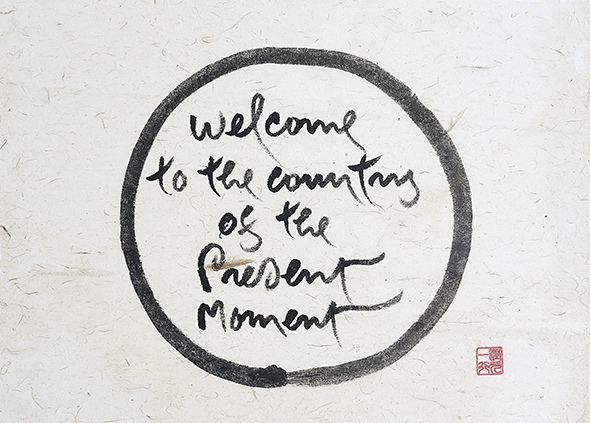By Gijs
 A young monk was trying really hard to meditate, but he just was not able to focus properly. Frustrated with himself, he went to his master and said: “Master, master, my mind is so full of distraction. I cannot even focus for a single moment!” The master calmly replied: ‘Don’t worry, it will pass.’
A young monk was trying really hard to meditate, but he just was not able to focus properly. Frustrated with himself, he went to his master and said: “Master, master, my mind is so full of distraction. I cannot even focus for a single moment!” The master calmly replied: ‘Don’t worry, it will pass.’
A week later, it seemed like he had some sort of breakthrough. His mind was crystal clear and his meditation went easily and smoothly. Proudly, he returned to his master and said: “Master, master. My meditation is going great. My mind is so quiet and clear!” The master replied calmly: ‘Don’t worry, it will pass.’ – Zen Story
When I first got into Buddhism, I thought attaining enlightenment was about attaining a special, otherworldly state of mind where one would just continuously feel good and would not be disturbed by anything. For a long time I tried very hard to force my mind into this peaceful, Zen state of mind. It seemed like I could get close to it, but at the end it would always slip through my fingers. Still, I hoped that somehow if I could push a little harder, things would magically clear up and I would have this final breakthrough.
The harder I tried though, the further away this state of mind seemed to be. At one point, I was trying so hard to control my mind that I could hardly feel anything but tense. Liberation felt so far away that I became quite desperate. I no longer knew what to do or how to be myself because whatever I tried, it just would not quite get me there. After some time, it became clear to me that I could no longer go on this way.
I realized I had been stuck in ideas about enlightenment. As the Buddha teaches, all suffering is caused by wrong perceptions. The Buddha also teaches everything is impermanent. There is no state of mind that does not change. In common language: You cannot force your feelings. And running after happiness makes it harder to attain. Enlightenment is not about attaining some constant state of mind; rather, it is about accepting the constant change that is there. You understand how this constant flow works, and you are ok with it. You do not try to achieve some special state of mind. Instead, you are just happy with your normal thoughts and feelings. Buddha mind is everyday mind, as the saying goes.
Trying to achieve some extraordinary state of mind is not enlightenment—it is escapism. You are dissatisfied with how you usually feel. You want to get rid of the banality of normal life. You want something more, something beyond your everyday thoughts and feelings. This is quite silly. There is nothing “else.” The Buddha teaches there is only accepting what is already there, the here and now. You do not try to run after something special, not in a material sense, but also not in an intellectual, emotional or even spiritual sense.
Enlightenment comes not with extraordinary feelings, but rather when you begin to see the extraordinary nature of what you once thought to be just normal and ordinary. You see a simple flower, and you can smile at the beauty of creation. And, on an internal level, you see the beauty that is there in this constant flow of feelings and states of mind. Your thoughts and emotions, your joys, and even your sadness and your anger are what allow you to be in touch with life. Without them, you would not be enlightened. Otherwise, you would be like some sort of zombie or robot. Even if it were possible to be in a state of constant bliss, what would be the point? You would just sit there in your bubble, completely out of touch with everything that goes on around you. You would not have a clue how amazing it is just to be alive, and to be able to breathe, walk, feel, sing and dance.
Suffering comes not from certain unpleasant states of mind. Rather, it comes from not understanding how the mind works. After ups come downs. There is sadness, and there is happiness. You cannot have the one without the other. Unfortunately though, we spent most of our lives thinking there is something wrong with the sadness and unpleasant feelings, while actually they are all right. All our thoughts and feelings just belong to our human nature, and there is something inherently beautiful about that.
That is why Buddhism teaches we actually are already enlightened, and we already possess Buddha nature from our birth. All we have to do is just to embrace our Buddha nature, which is our human nature. Stop running from it and just see the beauty of it. As Zen Master Lin Ji says: “Just be ordinary.” Stop trying to be special, but rather, just see the joy, the joy of just being normal.
These days, I no longer go around using meditation to try and attain some special kind of peace of mind. When I am happy, I am just happy. When I feel like singing, I sing. When I need rest, I rest. And when I feel sad, I just notice I feel sad, and I try to understand where it comes from. I no longer try to meditate it away. At most, I try and see what could be a skillful way to prevent myself from ending up in a situation that makes me feel sad. If this does not seem possible right away, I accept that just as well. “Don’t worry, it will pass.”


















